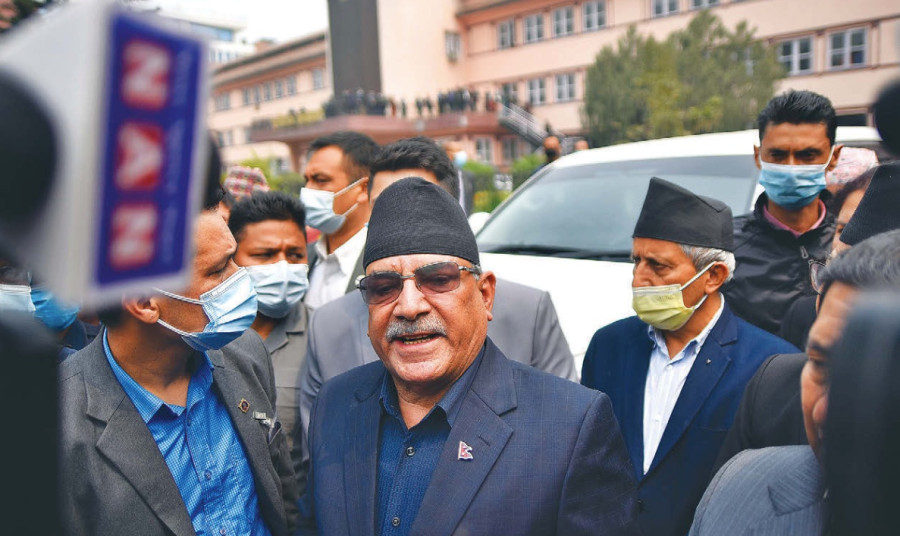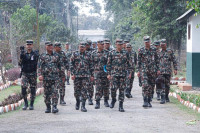National
Judiciary in the spotlight as political process is halted
Nepali politicians’ inertia and failure to find solutions to the deadlock politically could give room to non-political actors, which is not good for democracy, analysts say.
Binod Ghimire
When Prime Minister KP Sharma Oli suddenly dissolved the House of Representatives on December 20 over an infighting within his then party, the Nepal Communist Party (NCP), outrage poured in from various quarters—political actors, constitutional experts and civil society.
The move threatened the constitution's derailment. Many said democracy was under siege.
The widespread concerns emanated from the fact that the political democratic process could go out of parties’ hands, that non-political actors would start calling the shots and that the multi-party system would be hugely undermined.
All eyes were then on the Supreme Court, the final arbiter. The Constitutional Bench then on February 23 overturned Oli’s decision and reinstated the House.
The first meeting of the reinstated House was scheduled for March 7. But hours before the House meeting convened, the Supreme Court passed a judgment on an almost three-year-old case, which came as a bombshell for many, especially Pushpa Kamal Dahal.
Deciding on a petition challenging the Election Commission’s decision to register the Nepal Communist Party (NCP), the court not only scrapped the party but also revived the Oli-led CPN-UML and the Dahal-led Communist Party of Nepal (Maoist Centre), which had merged in May 2018 to form the party.
Since then, the House has been in place, political parties are there, but politics is deadlocked.
The Maoist Centre has been under pressure to withdraw the support it lent to Oli back in February 2018, but it has not done so even after the party was reinstated to the pre-merger state.
Instead, party chair Pushpa Kamal Dahal on Tuesday filed a petition at the Supreme Court seeking a review of the March 7 decision to revive the UML and the Maoist Centre.
After filing the review petition, Dahal told reporters that the court decision to revive the two parties [which had already united] was unnatural and political in nature.
“It is necessary to correct the decision that split the party formed after a merger of two parties for stability,” said Dahal. “We believe the court will pass a verdict in the spirit of the merger.”
Later on Tuesday, UML chair and Prime Minister Oli, speaking at a programme in Kathmandu, took a jibe at Dahal, saying the Maoist leader reached out to the court instead of holding political discussions on the matter.
Dahal, however, has argued that the court had entered into a political matter and given more in the verdict than what the petitioner had asked for.
Political analysts and legal experts say the current deadlock is the result of Nepali political parties’ inertia, which could be risky because politicians’ failure to take matters into their own hands could provide opportunity for non-political actors to take undue advantage.
Nepal’s politics of late is neither within the confines of Singha Durbar, the seat of power, nor New Baneshwor, where the legislature sits.
Analysts say the political parties must be able to find a solution to such stalemates politically rather than overly relying on the judiciary and that the increasing over-dependence on the court is not a good sign for democracy.
“The failure of the executive and the legislature has created a situation that the responsibility of finding a solution to some political crises has been thrust upon the judiciary,” said Ram Krishna Timilsena, former registrar of the Supreme Court who is currently executive director of the National Law College.
Whether the court should have scrapped the Nepal Communist Party (NCP) altogether is still a debatable matter, with opinions divided, as some say the court did the right thing and others, including Dahal, call it judicial activism.
Oli and Dahal, however, knew, as everyone else, very well in May 2018 when they merged their parties to form the Nepal Communist Party (NCP) that a party with a similar name existed. When they went to the Election Commission to register their party in May 2018, they were told that a party with the name Nepal Communist Party was registered in the name of Rishiram Kattel.
They, however, had managed to influence the Election Commission to register their party as Nepal Communist Party (NCP), with NCP within brackets. It was apparent then itself that it could be contested in the court of law. And it did happen. Kattel on December 7, 2018 filed a petition at the court demanding that the party name be given to him.
The parties, hence, had given an opportunity then only to the court to make a decision on the case. However, the court took almost three years to decide and when it passed the judgment, the political situation was already fluid.
Nepali politicians and lawmakers, according to Timilsena, failed to see potential complexities and left loopholes, some deliberately, thereby leaving everything for the court to interpret. That’s why it looks like the country’s political course is being defined by the court and not by political actors, said Timilsena.
Dahal’s review petition on Tuesday, in essence, means the court should overturn its March 7 decision, which will mean the UML and the Maoist Centre’s merger must be recognised.
But while reviving the UML and the Maoist Centre, the court had ordered the Election Commission to give them a new party not contradicting any existing laws if the two parties wish to merge again. The court had given 15 days to do so. The two parties did not seek to reunite.
Analysts say Nepal’s politics reached the Supreme Court because politicians failed to find a political solution to their problems.
“It’s because of Nepali political actors’ failure that the judiciary is taking the lead in defining the country’s political course,” said Bidur Prasad Phuyal, a professor of political science at Tribhuvan University. “By filing a review petition, the Maoist Centre is actually requesting a merger with the UML. Actually, it should have tried to find a solution politically.”
Nepal’s federal government is made up of three branches—the executive, the legislative and the judiciary. They are entrusted with their responsibilities in such a way that it ensures separation of powers, limiting one branch from exercising the core functions of another.
“The intent is to prevent the concentration of power and provide for checks and balances,” said Phuyal, the political science professor. “It is wrong to give more room to the judiciary to decide the political course.”
Some argue that the court would not have got much space had Oli resigned on moral grounds after the Constitutional Bench overturned his decision to dissolve the House.
Even after the court reinstated the House, Oli has tried to justify that his dissolution move was right. He has not hidden his intentions to dissolve the House again, saying it has become irrelevant and that a fresh mandate from the people is the need of the hour.
Nepali politicians have once in the past already chosen a non-political actor to help bring the country’s politics on track. After a long-drawn political stalemate, politicians had agreed to install Khil Raj Regmi, then chief justice of the Supreme Court, to chair the Council of Ministers in March 2013, whose government then oversaw the November 2013 Constituent Assembly elections.
The more inaction of political forces, the more room non-political actors will get to exercise their influence, say analysts.
“Power is blind. If political parties fail, it could raise the court’s ambitions,” said Timilsena, the former registrar of the Supreme Court. “The executive and the legislature should be at the centre of political games.”




 8.26°C Kathmandu
8.26°C Kathmandu














